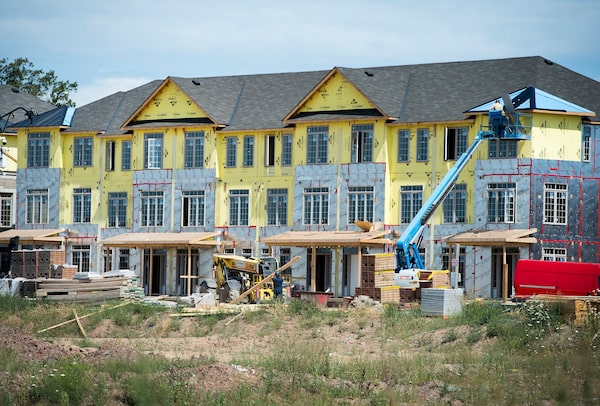
Real estate markets have grown strongly in Ontario this year and have climbed for the past two years in major centres in Quebec.Nathan Denette/The Canadian Press
New housing starts climbed sharply in Canada last month, driven by accelerating construction in Ontario and Quebec, while every province from Manitoba westward saw declining activity.
The sharp divide in new construction activity among regions of the country mirrors the resale home market in Canada, where sales have climbed this year in Ontario and Quebec but weakened across the Prairies and British Columbia.
New housing starts were up 12 per cent nationally in August compared with the same month last year as construction began on 17,611 new homes last month, according to new data from Canada Mortgage and Housing Corp.
Housing starts rose 62 per cent in Quebec and 32 per cent in Ontario compared with August last year, according to CMHC, while activity fell by 35 per cent in Manitoba, 6 per cent in Saskatchewan, 8 per cent in Alberta and 19 per cent in B.C.
Real estate markets have grown strongly in Ontario this year and have climbed for the past two years in major centres in Quebec, as both provinces have recorded economic growth and strong population increases. Alberta and Saskatchewan have struggled with weakening commodity prices, and B.C. has faced a series of housing regulatory changes that cooled buyer demand in 2018 and 2019.
Housing starts also climbed by 28 per cent in Atlantic Canada in August, but the increase was due primarily to the launch of multiunit buildings in New Brunswick.
CMHC chief economist Bob Dugan said construction starts on detached houses trended higher in both July and August after about a year of declines. But one of the biggest factors pushing housing starts higher has been increasing launches of condominium projects in many large cities, he said.
In the Greater Toronto Area, for example, detached house starts climbed 7 per cent in August compared with last year, while launches of other types of housing – including high-rise condominiums – rose 31 per cent.
Housing starts soared by 120 per cent in the booming Montreal market and 134 per cent in Quebec City last month compared with August, 2018.
Vancouver has struggled, however, as the region has faced a major real estate downturn, which has led to a sharp downturn in the resale housing market and has made developers more leery about launching new projects while demand remains weak. Total starts fell 20 per cent last month from a year earlier.
Toronto-Dominion Bank economist Rishi Sondhi said housing starts in B.C. fell in August after being inflated earlier in the year as builders hurried to launch projects ahead of new development fees.
The city’s new fees came into effect on May 1, spurring a sharp increase in construction launches in April. The volume of building permits issued in the Vancouver region in April more than doubled compared with their 2018 level.
In July, Vancouver’s city council decided to cancel a planned 5.2-per-cent inflationary increase in various development cost levies and other fees for new residential projects, which were set to come into force in September. The city said it was concerned about the downturn in the city’s residential building sector this year.
On an annualized basis, housing starts in Canada are on track to hit 226,600 this year, which is ahead of economists’ predictions of 212,500. Starts in August were up 1.9 per cent compared with July on an annualized basis.
National Bank of Canada economist Jocelyn Paquet said single-family home starts in urban areas reached a 13-month high in August on an annualized basis, after adjusting for seasonal variations, just months after starts hit their lowest level on record in February.
Mr. Sondhi said the third quarter of 2019 is likely to be healthy for residential activity, especially combined with an anticipated increase in existing home sales.
“Moving forward, home building is likely to remain strong through the remainder of this year, as solid demand fundamentals – namely low mortgage rates, healthy population growth and solid labour markets –underpin construction,” he said in a research note.
Also Tuesday, Statistics Canada said the value of new building permits issued across Canada climbed 3 per cent in July compared with June. Most of the gain came from the industrial, commercial and institutional building sector, where permits climbed by 4.3 per cent over June and 9.7 per cent compared with July last year, while residential construction permits were up a more modest 2.2 per cent over June, and fell 4.3 per cent compared with July last year.
Your time is valuable. Have the Top Business Headlines newsletter conveniently delivered to your inbox in the morning or evening. Sign up today.